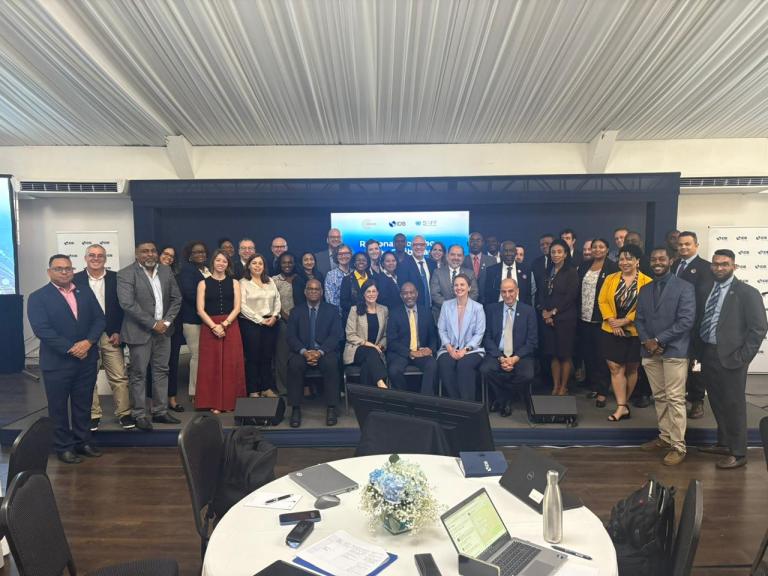A major workshop in the Caribbean has identified opportunities to leverage regional collaboration to close weather and climate data gaps and build resilience to extreme events such as tropical cyclones.
The Caribbean Regional Workshop was co-hosted by Systematic Observations Financing Facility (SOFF), the Inter-American Development Bank (IDB) and the Climate Risk & Early Warning Systems initiative (CREWS). It took place from 5-7 May 2025 in Kingston, Jamaica.
Extreme weather and climate events in the Caribbean increased by 85% between 2001 and 2020, costing an annual average of 2.13% of regional GDP, according to a report from the Organization for Economic Cooperation and Development and Inter-American Development Bank. Hurricane Beryl - the earliest category 5 hurricane on record - caused widespread devastation in the Caribbean in 2024 and is an example of the risks faced by communities in low-lying states.
Caribbean countries are therefore priority targets for the Early Warnings for All initiative , which seems to ensure that everyone is protected by early warning systems by the end of 2027. In order to achieve this, investments and action across the entire value chain are necessary.
From increased weather and climate data supported by SOFF, to early warning systems initiatives supported by CREWS and ensuring impact across sectors on the ground through IDB and other implementing partners, each step is critical to ensure enhanced resilience for lives and livelihoods.
"Data is essential for predicting and responding to weather and climate events. This data gap doesn't just affect local forecasts. It impacts our global ability to forecast and therefore respond to climate challenges," said WMO Celeste Saulo. "Switzerland alone, where WMO is based, has more reporting surface stations than the entire Caribbean region combined," she said in an opening video message to the workshop.
Evan Thompson, Principal Director of the Jamaica's Meteorological Service President of WMO's Regional Association for North America, Central America and the Caribbean, said the workshop would be "create leverage with regional partners and other climate investments, and joining forces for climate change adaptation in the Caribbean."

Addressing common challenges and enhancing regional synergy
At the workshop, participants from 16 Caribbean countries, operational partners, regional organizations, and multilateral and bilateral partners voiced their priorities and challenges.
It marked an important milestone to gather crucial input, and identify a path forward for regionally coordinated implementation for Caribbean countries. This joint effort will improve basic weather and climate data collection and early warning systems in the Caribbean, paving the way for more resilient and climate-adaptive communities across the region.
Arlene Laing, the Coordinating Director of the Caribbean Meteorological Organization (CMO) said, "We welcome these joint efforts by SOFF, IDB and CREWS. The region critically needs investments in enhancing observational and warning systems while building technical and human capacity. This will deliver scientific expertise and guidance to the people of our region."
Many countries across the region face similar technical and operational issues. Regional collaboration and sharing lessons learned are essential.
The workshop sought to advance progress towards implantation of the Global Basic Observing Network and serve as a model for other regions, demonstrating how cooperation and strategic investment can drive progress in meteorological observation and early warning systems.
It identified key challenges including a fragmented infrastructure landscape that is difficult to maintain and sustain, calling for more harmonized development projects and a regional approach to procurement and calibration.
Participants highlighted the need for enhanced capacity development and financial support. In particular, countries discussed the need for expanded upper-air and marine observations given their location and large marine Exclusive Economic Zone areas.
CREWS
The CREWS Initiative finances the Caribbean 2.0 project, which is implemented by WMO and the United Nations Office for Disaster Risk Reduction (UNDRR). Building on weather and climate data, the project will enable the implementation of life-saving multi-hazard early warning systems and strengthen resilience in Caribbean small island developing states.
SOFF
SOFF opened its door for business in 2022 as a new specialized UN climate fund. It focuses exclusively on supporting countries in closing their basic weather and climate data gaps.
Today, 61 countries have already received SOFF support. Within the Caribbean region, 16 countries received a total of USD 4 million in approved grants. This will fund the development of national gap analyses and national plans through peer-to-peer technical assistance with countries, and fund investments, starting with Belize in this region.






